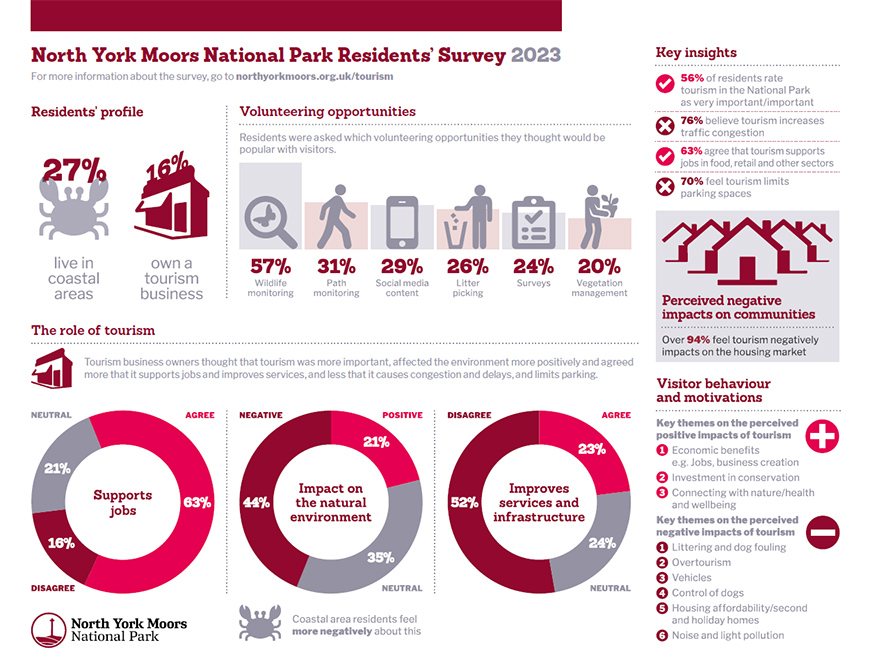Overview
- As part of our Regenerative Tourism work to engage with our local communities and listen to their views, we undertook Residents' survey in 2023 specifically focused on helping us understand how tourism is affecting residents' local areas, to explore opinions on the role of tourism and better understand the positive and negatives of tourism.
- The primary aims of the survey were to help establish a baseline in residents’ attitudes to tourism and to set a target related to improving resident satisfaction in relation to tourism.
- We were also keen to understand which volunteering opportunities residents thought might be popular with visitors.
- An online survey was conducted between 8 May and 8 June, with 701 valid responses.
- York St John University was commissioned to conduct the analysis of survey data (report authors: Dr Jenny Hall, Dr Dmytro Moisieiev and Dr Brendan Paddison, York Business School).
Executive summary
Analysis of the quantitative data by York St John University found that 56% of residents saw tourism as important or very important, in contrast to 15% who did not. Geographically, residents in YO13 (South-East corner of the National Park) found tourism significantly more important than residents of YO21 (Whitby and Westerdale).
Regarding environmental impact, residents felt that tourism had a slightly negative effect on the environment. Residents in coastal areas felt that tourism affected the natural environment significantly worse than those who do not live in coastal areas.
We’ve produced an infographic (pdf) outlining some of the key quantitative findings.

An analysis of qualitative responses identified several key themes. In the context of resident concerns regarding the impacts of tourism, key themes identified were framed around the environmental, social, economic and cultural impacts of tourism, especially pollution, overtourism, traffic concerns, dog behaviour and dog fouling, gentrification, second home ownership, low paid jobs and noise and light pollution.
Respondents also felt that the National Park Authority had a key role in addressing these concerns. Respondents that perceived tourism to have positive benefits to the National Park tended to focus on the economic benefits of tourism, associated with investment, jobs, business creation and investment in conservation, education, access and health.
Finally, several recommendations are made on the findings and future survey design. These recommendations focus on active travel, regenerative tourism, well-being mindset, raising awareness of the role of NYMNPA and the development of an affordable housing strategy.
Residents’ perceptions of the negative impacts of tourism
Residents’ comments about the impact of tourism on the natural environment were resoundingly negative (93%) in their sentiment. Some acknowledged the importance of tourism to the economy but voiced concerned around its impact:
A careful balance needs to be struck between enabling and encouraging people to enjoy the natural environment and bring much needed economic benefits to rural communities and excessive and detrimental pressure being put on the natural environment through human activity linked to tourism
Many expressed concern over the lack of infrastructure to service both residents and visitors and the feeling of exclusion this can generate – especially in “honeypot” locations.
there isn't the infrastructure to cope with tourism and as a resident I often feel excluded in favour of tourists.
Second home ownership and lack of affordable housing were key issues for many residents:
the number of homes devoted to tourism has been unsustainable for a long time. It is now untenable
in last 3-4 years a large proportion of houses in our village has been bought for speculative holiday lets. Most now stand empty for most of the year
which led to a feeling that:
our villages are becoming ghost villages.
Yet there was a more benevolent feeling towards:
holiday cottages that allow people who can't afford to live here a chance to spend some time in the area and community.
Overall, there was a strong perception that greater emphasis should be placed on a mixed economy that did not create communities solely dependent on tourism. Ultimately, it was felt that the North York Moors required a more sustainable approach to achieve:
the correct balance to ensure local communities are able to thrive.
To do this, it was perceived that public authorities should take:
a light touch, allowing sensible and sensitive tourism to grow that develops alongside local communities needs.
Our Management Plan recognises these challenges and includes an objective to double the rates of affordable housing and to press for changes to control the conversion of housing to second or holiday homes. We are interested in working with any local communities that wish to develop more affordable housing in their villages, please email us at policy@northyorkmoors.org.uk
Residents’ perceptions of the positive impacts of tourism
The top-of-mind positive positives about tourism were centred around the economic benefits, and the opportunity for conservation, education, access and health.
tourism is vital for the economy of this area, so many villagers and residents earn a part of their income from tourism. It keeps our area alive and vibrant!
Respondents also acknowledged that
the park protects the environment so tourists can enjoy it. Without tourists we wouldn’t have the money to protect the environment.
and
for some people the park is where they connect with Nature, where they breathe and slowdown in our busy world.
